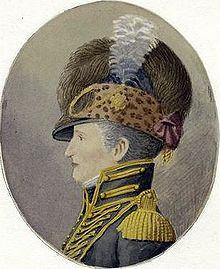Wade Hampton I.
Wade Hampton I. (* 1754 in Province of South Carolina , † February 4, 1835 in Columbia , South Carolina ) was an American soldier of the American Revolutionary War and the War of 1812 , landowner and politician .
biography
Wade Hampton grew up on a farm in South Carolina. During the War of Independence, he distinguished himself as a cavalry officer under Major General Thomas Sumter and reached the rank of lieutenant colonel . After the war, he was elected to the South Carolina Assembly , the state parliament, from 1779 to 1786 and again in 1791 . From 1795 to 1797 and from 1803 to 1805 he was a member of the United States House of Representatives for the Democratic Republicans .
In 1808 he rejoined the US Army , received the rank of colonel and command of one of the regiments newly established in anticipation of a war with Great Britain . In February 1809 he became a brigadier general and got a post in New Orleans . Due to numerous conflicts with subordinate officers, he was replaced by Major General James Wilkinson , which resulted in bitter hostility between the two men. After the outbreak of the war with Great Britain in 1812, he was given the rank of major general and command of an army near Plattsburgh ( New York ) in March 1813 , but was subordinate to Wilkinson. In his contempt for his superior, Hampton went so far as to ignore his orders completely unless communicated directly to him through Secretary of War John Armstrong . With an army of over 4,000 men, Hampton was supposed to advance towards Montreal as part of a pincer attack on British Canada in October 1813 , but was defeated by British-Canadian troops under Colonel Charles-Michel de Salaberry in the Battle of Châteauguay on October 26th fought back and then withdrew to the USA. An investigation by Armstrong absolved him of all responsibility, nevertheless Hampton gave up his command in April 1814 and retired into private life.
He made a great fortune through successful land speculation. When he died in Columbia on February 4, 1835, he was one of the richest men in America and owned about 3,000 slaves . The abolitionist Theodore Weld cited a witness who claims to have heard how Hampton boasted that he had killed an experiment with their diet some of his slaves. He said: "[T] hey died like rotten sheep !!" ("They died like rotten sheep.") Wade Hampton is considered a classic example of one of the southern slave oligarchs . He is portrayed as a proud, bossy, unyielding character and an excellent administrator of his extensive estates.
In his first childless marriage in 1783, he was married to the widow Martha Epps Howell . After her death in 1784, he married Harriet Flud in 1786 , and after her death in 1794 in third marriage, Mary Cantey . His children included the officer and planter Wade Hampton II (1791-1858), who took part in the Battle of New Orleans as a colonel under Andrew Jackson ; a grandson was the Confederate Cavalry General and future Governor of South Carolina, Wade Hampton III. (1818-1902).
literature
- Ronald Edward Bridwell: The South's Wealthiest Planter: Wade Hampton I of South Carolina, 1754-1835 . Ph.D. diss., Columbia 1980
- Charles Edward Cauthern (Ed.): Family Letters of the Three Wade Hamptons, 1782-1901 (South Carolina Sesquicentennial Series, No. 4). Columbia 1953.
- Hampton, Wade . In: James Grant Wilson, John Fiske (Eds.): Appletons' Cyclopædia of American Biography . tape 3 : Grinnell - Lockwood . D. Appleton and Company, New York 1887, p. 69 (English, Textarchiv - Internet Archive ).
Web links
- Wade Hampton in the Biographical Directory of the United States Congress (English)
Individual evidence
- ^ Theodore Weld: American Slavery as It Is: Testimony of a Thousand Witnesses . THE AMERICAN ANTI-SLAVERY SOCIETY, New York 1839, p. 29 (English, digitized from Documenting the American South, University of North Carolina at Chapel Hill [accessed May 27, 2020]).
| personal data | |
|---|---|
| SURNAME | Hampton, Wade I. |
| BRIEF DESCRIPTION | American general, politician and planter |
| DATE OF BIRTH | 1754 |
| PLACE OF BIRTH | South carolina |
| DATE OF DEATH | February 4, 1835 |
| Place of death | Columbia , South Carolina |

